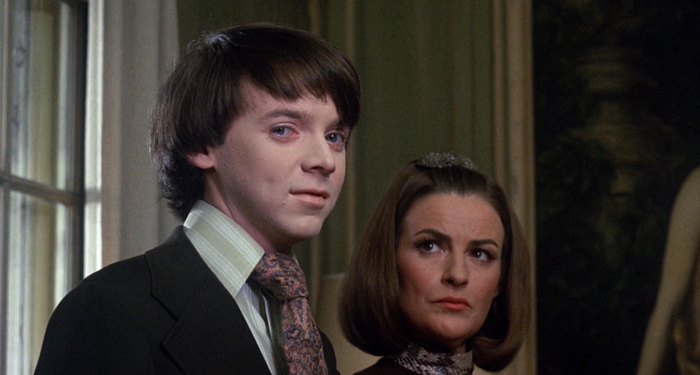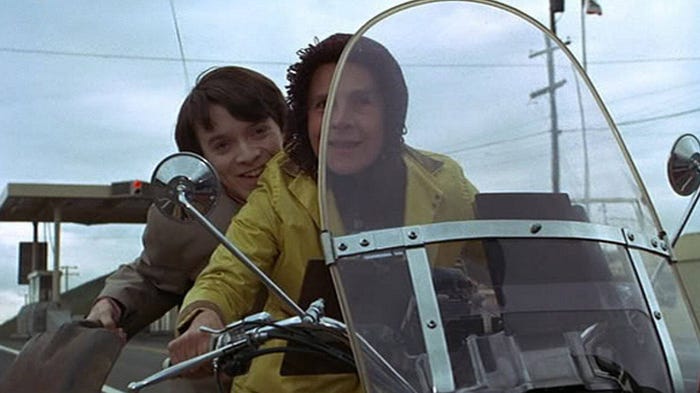I sometimes tell people I'm a laugh slut.
I laugh easily. You make a pun? I laugh.
You tell a long-winded story that ends in an underwhelming punchline? I tip my hat to you, sir.
But a unique satisfaction comes when you laugh at something terrible. You know you shouldn't. But that just makes it funnier.
Once in a while, a creator manages to penetrate your defenses and finds you lacking. You're surprised.
Your political-correctness firewall got trojan-horsed.
I love that feeling.
While the official title Harold and Maude manages to preserve the mystery, the title in Portuguese (Teach Me How to Live) affirms this film as the incredibly positive, joyous, and life-affirming artwork it is.
Nonetheless, here's a trigger warning: this article and film include references to suicide and self-harm.
Hal Ashby sets the tone of this dark comedy from the very first scenes, where we see 17-year-old Harold ceremoniously hang himself to the tune of Cat Steven's Don't Be Shy.
"Oh, dinner at 8:00, Harold. And do try to look a bit more vivacious"
She said, to her son who's very much alive, but hanging by the neck in their living room.
In the beginning, Harold is young, rich, and bored to death. His favorite pastimes include torturing his self-obsessed mother with mock suicides, attending stranger's funerals, and driving around in a hearse (a funeral car).

It's at these funerals he meets Maude, a 79-year-old with a child-like blissfulness.
Her interests include playing the banjo, stealing other people's cars, and trying something new each day.
In between the romance, dark comedy, and high-jinks, there's subtle anti-war and anti-catholic commentary.
Director Hal Ashby and the cast also deliver beautiful zooms and visual juxtapositions, inspiring monologues, and brilliant comedic timing.
The (Anti) Rom-Com
In Eric Pierce's article, "What's the Difference Between Okay Rom-Coms and Great Ones?" he had this to say about one of my favorite genres:
"Their potential is just restrained by the conventions of the genre — the meet-cute; the role of misunderstandings as sources of conflict; the inevitability of the happy ending, which is both a buoy and an anchor. For a rom-com to stand out, it needs to do something unexpected and different"
At first sight, you might be fooled into thinking this movie is a rom-com: Boy meets girl, they spend their days together, their lives changed forever… The Portuguese version of the title all but seals the deal.
But if you look deeper, you'll soon realize this film is the anti-rom-com.
The rom isn't really a rom, but rather an apprenticeship in the art of living.
The com isn't your traditional com, more of a quick guide on how to avoid law enforcement and not worry too much about it.
In a way, Harold and Maude is less 500 Days of Summer, and more Karate Kid meets Fight Club. Brad Pitt is real, and also a 79-year-old lady. Instead of cancer support groups, the protagonists meet at a funeral, after which Maude promptly steals the priests' Volkswagen Beetle.
What's textbook rom-com about this film is one of the main characters is unhappy until they find love. Except that unhappiness is not a case of workaholism, but of boredom and teenage aangst.
Harold's mother sends him to a psychoanalyst, sets him up with blind dates, and buys him a luxury car, all schemes he subverts in his own morbid ways.
Harold's harmless deaths are presented as a relatable form of teenage rebellion: we've all tested our parent's patience even when we knew we shouldn't.
Harold's way is just a bit more gore-y. He finds little bits of joy in his mother's annoyance and his Internet dates's shock.
The meet-cute also happens. "It's a delight to run into you," she says, as she's in the process of stealing Harold's car.
Maude appears in his life as a Manic Pixie Dream Girl, around 30 years before the trope became mainstream. The age difference between the two lead characters (62 years) and Maude's past as a Holocaust survivor add depth to a character that could have been too quirky to believe, but feels plausible, and even likely.
The contrived misunderstanding happens at the end of the movie, when one of the characters decides to leave, and the other isn't quite ready to let go.
Although the happy ending feels inevitable, it doesn't come in the way that you'd expect.
How's that for doing something unexpected and different?
Harold and Maude is my favorite cult film because I'm a sucker for a rom-com with a greater message.
"Everyone has the right to make an ass of themselves. Don't let the world judge you too much" — Harold and Maude
The fact that Maude is a holocaust survivor, or how Harold survives his deaths, is brushed off. She has no plans to wallow in her own self-pity, and neither should you.
We're taken along on this journey of Harold falling in love with the very thing he used to mock — life.
Harold goes from literally looking like a corpse, wearing black suits and often positioning himself like a lifeless body, to wearing colorful clothing and resembling a living, breathing human by the end.
The film presents different viewpoints on what constitutes a good life, pokes some holes in them, but doesn't spoon-feed you what's the right one.
It's a story about (be)coming alive.
We all get up caught in what we think matters. Everyone needs a reminder, a Maude figure, to reminds us to live, live, live.


